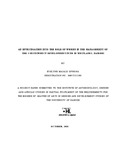| dc.description.abstract | This study investigated the role of women in the management of the Constituency Development
Fund in Westlands constituency, Nairobi. The CDF was set up by the government under the
CDF Act 2003. The main aim of its establishment was to alleviate poverty at the grassroots and
to encourage citizen participation in governance. Since its inception, it has had a positive impact
where it has been managed well. However, in some constituencies, there have been numerous
complaints on how it is managed.
The research had two specific objectives. First it sought to investigate the extent to which
women are involved in the management of the CDF in Westlands Constituency. Secondly, it
sought to identify and discuss the factors that might work against women's participation in the
management of the CDF in the constituency.
In undertaking the study, secondary data was used to identify the research problem and was used
throughout the study. Primary data was collected through in-depth interview guides using open
ended questions. All the respondents interviewed were aged between 18 and 50 years, and most
were small medium entrepreneurs. Twenty per cent had no education while 40% had only
attained primary level education.
The study found that several factors account for the poor participation of women in the
management of the CDF. These include: lac'I( of information/awareness, education/training,
capacity building, transparency, adequate representation and nepotism were the main obstacles
hindering women from participating effectively. Others ;ere corruption, family, cultural
attitudes, poor lobbying skills, permission from husbands and lack of time.
The results showed that 80% of the respondents felt that women's participation in the CDF
management was very low while 30% stated that they had accessed the CDF through bursaries
for their children. Seventy per cent felt that lack of information and awareness was the key
factor that deterred women from participating effectively, while another 70% felt that corruption
was another major impediment.
VII
The study also revealed that the fact that the MP nominates the CDFC has played a big role in
the COFC not representing the grassroots needs. Thus even the women representatives in the
COFC are not actively involved in the governance of the COF.
The following recommendations are made: The government should review section 23 (8) of the
COF Act 2003 which gives the MP power to constitute and convene the COFC and section 23
(I) that stipulates the composition of COFC to conform to the Affirmative Action Act.
Participation of women in the management of the COF should be enhanced. Information
regarding how women can access the COF funds should be disseminated. The government may
need to create an enabling environment for the grass roots women in order for them to participate
effectively | en |

